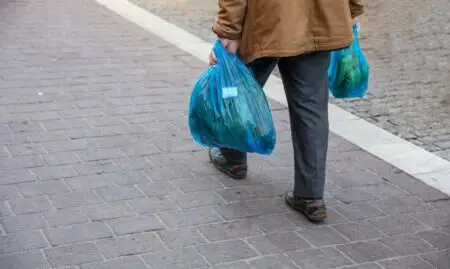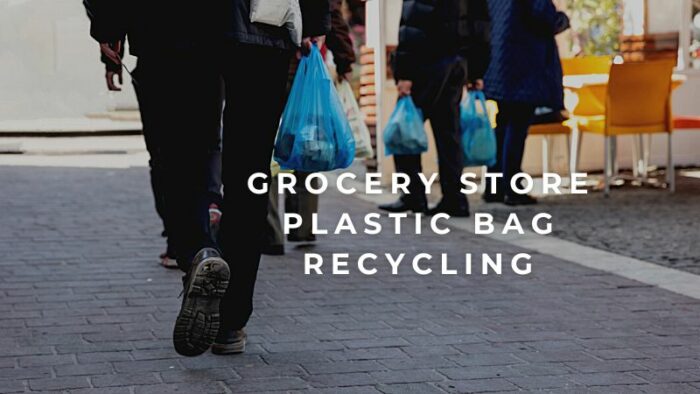Many grocery stores and other retailers offer plastic bag recycling programs to reduce waste and promote sustainability. Some stores have in-store recycling bins for plastic bags, while others may have a program to collect and recycle used bags.
Here are a few tips for finding a grocery store that recycles plastic bags:
- Check the store’s website or customer service desk for information on their recycling program. Many stores have information on their recycling efforts and how customers can participate.
- Call the store and ask about their plastic bag recycling program.
- Look for in-store recycling bins specifically for plastic bags. These bins are usually located near the store’s entrance or exit.
- Ask a store employee if they have a recycling program for plastic bags.
Keep in mind that not all stores have plastic bag recycling programs, and the availability of these programs may vary by location. It’s always a good idea to check with the store to find options for recycling plastic bags.
Stores That Have Plastic Bag Recycling Programs
Many stores offer plastic bag recycling programs. Here is a list of a few retailers that accept plastic bags for recycling:
- Walmart
- Target
- Costco
- Safeway
- Kroger
- Publix
- Whole Foods
- Meijer
- HEB
This is just a small sampling of the stores that offer plastic bag recycling programs. It’s always a good idea to check with your local store to see if they have a program. Some stores may have in-store recycling bins specifically for plastic bags, while others may have a program to collect and recycle used bags.

Alternatives to Plastic Grocery Bags
There are several alternatives to plastic grocery bags that are more environmentally friendly and sustainable:
- Reusable fabric bags: These can be made of materials like cotton, canvas, or recycled plastic and are designed to be used multiple times. They are an excellent option for grocery shopping and can also be used for other purposes, like carrying books or beach gear.
- Reusable paper bags: These bags are made of paper that is treated to be more durable and able to hold more weight than standard paper bags. They can be used multiple times and are often more affordable than fabric bags.
- Reusable mesh bags: These bags are made of lightweight, breathable material and are perfect for carrying produce or other loose items. They are easy to clean and can be used over and over again.
- Biodegradable plastic bags: These bags are made from plant-based materials and are designed to break down more quickly in the environment than traditional plastic bags. However, it’s important to note that biodegradable bags are not a perfect solution. They still require energy and resources to produce and may not break down as quickly as advertised.
- Boxes and containers: Instead of using bags, consider using reusable boxes or containers to carry your groceries. This is a particularly good option for items prone to spilling or crushing.
By choosing to use these alternatives to plastic grocery bags, you can help reduce plastic pollution and promote a more sustainable future.
What Happens When Plastic Bags Go To The Landfill?
When plastic bags go to a landfill, they do not break down and decompose like other organic materials, such as food scraps or yard waste. Instead, they remain in a landfill for an extended period, potentially hundreds of years. This can take up valuable space in the landfill and contribute to environmental issues.
Plastic bags in the environment, such as in oceans or waterways, can also have negative impacts. They can harm wildlife, such as birds and fish, that may mistake the bags for food or become entangled.
Recycling plastic bags can help reduce the amount of waste in landfills and the negative environmental impacts. Many stores and other retailers offer plastic bag recycling programs to collect and properly dispose of these items. Participating in these programs can help reduce waste and promote sustainability.
The Role of Consumers in Plastic Grocery Bag Recycling
Consumers have a significant role in reducing plastic grocery bag waste and increasing recycling rates. Here are a few ways that consumers can make a difference:
- Bring your reusable bags when shopping for groceries. This is one of the most effective ways to reduce plastic bag usage and waste.
- Properly recycle plastic grocery bags. Many grocery stores have recycling bins for plastic bags, so be sure to use them. You can still recycle your plastic bags at home if your store doesn’t have a recycling program.
- Support businesses and organizations that are committed to reducing plastic waste. Look for companies that use environmentally-friendly packaging and support initiatives to reduce plastic pollution.
- Spread the word about the importance of plastic grocery bag recycling. Share information with friends and family and encourage them to reduce plastic bag usage.
- Get involved in local and national efforts to reduce plastic bag waste. Support legislation and policies that reduce plastic pollution and increase recycling rates.
By taking these steps, consumers can play a critical role in reducing plastic grocery bag waste and promoting a more sustainable future.
International Efforts to Reduce Plastic Bag Waste
There are many international efforts to reduce plastic bag waste and increase recycling rates. Some examples include:
- The European Union has implemented several measures to reduce plastic bag usage, including setting targets for member states to reduce the use of single-use plastic bags and requiring retailers to charge for plastic bags.
- In 2002, Bangladesh became the first country to ban plastic bags outright due to their negative impact on its sewage and drainage systems.
- Many other countries, including Australia, China, India, and Kenya, have implemented bans or taxes on plastic bags to reduce their use.
- The United Nations has also recognized the need to reduce plastic bag waste and has launched several initiatives, including the CleanSeas campaign, which aims to eliminate single-use plastic products, including plastic bags, by 2030.
- Numerous international organizations and initiatives are working to address plastic pollution, including the Plastic Pollution Coalition and the Ocean Conservancy, which work to reduce plastic waste and increase recycling efforts worldwide.
Conclusion
Plastic bags can negatively impact the environment when they end up in landfills or the natural environment. Recycling plastic bags is a critical way to reduce waste and promote sustainability.
Many stores and retailers offer plastic bag recycling programs, and participating in these programs can help reduce the amount of plastic waste in landfills and protect the environment. It’s always a good idea to check with your local store to see if they have a plastic bag recycling program and to properly dispose of your plastic bags to help reduce their negative impacts on the environment.

